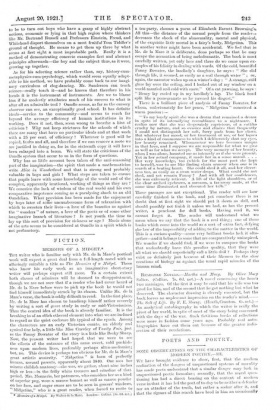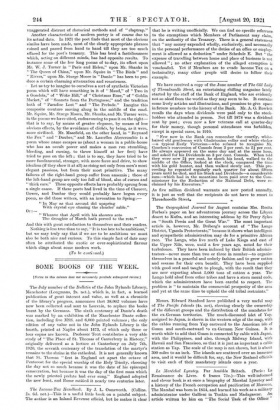POETS AND POETRY.
SOME OBSERVATIONS ON THE CHARACTERISTICS OF MODERN POETRY.-11I.
WE have brought evidence to show, first, that the modern realization of the dangers of unquestioned systems of morality has made poets understand that a similar danger may lurk in unquestioned poetic formulae ; secondly, that the moral ques- tioning has had a direct bearing on the content of modern verse in that it has led the poet of to-day to be neither a defender nor an attacker of the truth, but rather a seeker after it, and that the rigours of this search have bred in him an occasionally
exaggerated distrust of rhetorical methods and of " claptrap." Another characteristic of modem poetry is of course due to its actual date. In 1921 the poet finds that most of the obvious similes have been made, most of the clearly appropriate phrases coined and passed from hand to hand till they are too much effaced for the poet's treasury. This has bred a fastidiousness which, acting on different minds, has had opposite results. To instance some of the few long poems of to-day, its effect upon Mr. W. J. Turner in " Paris and Helen," upon Mr. Shanks in " The Queen of China," upon Mr. Squire in " The Birds " and " Rivers," upon Mr. Sturge Moore in "Dance" has been to pro- duce a certain charming attenuation and remoteness.
Let us try to imagine to ourselves a sort of synthetic Victorian poem which will have something in it of " Maud," of " Two in a Gondola," of " Woke Hill," of " Christmas Rose," of " Goblin Market," of " Sonnets from the Portuguese," and the tradition both of " Paradise Lost " and " The Prelude." Imagine this composite creature moving along in the middle of the road. Mr. Squire, Mr. Sturge Moore, Mr. Shanks, and Mr. Turner were, in the poems we have cited, endeavouring to pass it on the right— that is to say, by means of greater elegance, by means of less obvious effects, by the avoidance of cliches, by being, as it were, more civilized. Mr. Masefield, on the other hand, in " Reynard the Fox " and " Dauber," and Mr. Lascelles Abercrombie is a poem whose name escapes us (about a woman in a public-house who has an occult power and makes a man run stumbling, bleeding, and cursing, to throw himself at her feet) have tried to pass on the left ; that is to say, they have tried to be more fundamental, stronger, with more force and drive, to show idealism (if they show it at all) as rising not only from men's most elegant passions, but from their most primitive. The many failures of the right-hand group suffer from anaemia ; those of the left-hand group are only too full of blood, also of curses and " thick ears." These opposite effects have probably sprung from a single cause. If these poets had lived in the time of Chaucer, Gower, and Dunbar they would probably have begun every poem, as did those writers, with an invocation to Spring:- " In May as that around did upepring With crystal eye chasing the cloudes' sable."
Or :- " Whanne that April with his shoures sots Tho droughts of March hath parted to the rote."
And this with great satisfaction to themselves and their readers. Nothing is less true than to say, " It is too late to be ambitious," but we may truly say that if we are to be ambitious we must also bo both nice and curious. To this simple fact of date may often be attributed the exotic or over-sophisticated flavour which clings about some modern work.
(To be continued.)



































 Previous page
Previous page